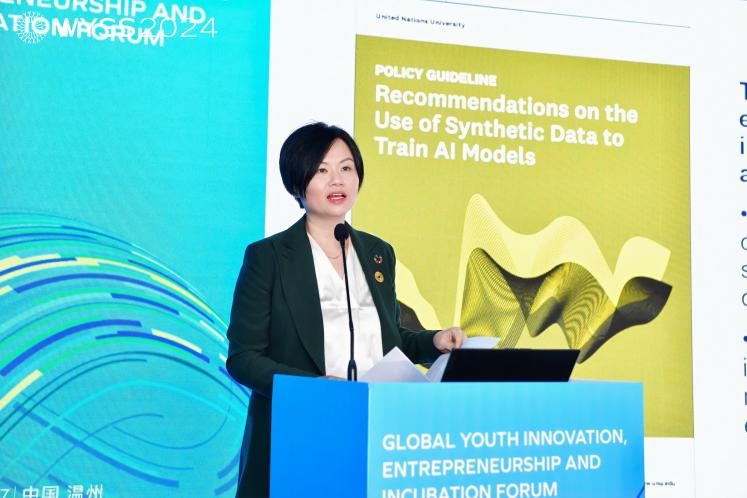Ladies and Gentlemen, distinguished guests, colleagues, and young scientists,
It is an honor to join you today at the World Young Scientist Summit 2024 here in Wenzhou, China. This summit’s commitment to uniting talent from around the globe to drive scientific innovation and entrepreneurship, especially among the younger generation, is truly inspiring.
I want to extend my heartfelt appreciation to the organizers for establishing a platform that amplifies diverse voices and perspectives. The summit’s theme, Converging the World's Talents, Creating a Better Future, resonates deeply with our mission at the United Nations University (UNU) in Macau, which is dedicated to leveraging digital technology to tackle global challenges while promoting sustainability and equity.
As the Director of the UNU Institute in Macau, I would like to introduce you to our organization. UNU is a global network focused on addressing pressing global issues through research, training, and education. As a UN organization and think tank, we engage in teaching and policy-relevant research across various critical areas. With 13 institutes in 12 countries, our headquarters in Tokyo guides the diverse initiatives spread across Asia, Europe, North America, and Africa. Notably, UNU will celebrate its 50th anniversary in 2025.
UNU Macau stands as the only institute within the UNU network that specializes in digital technologies and the Sustainable Development Goals. Founded in 1992, our institute initially focused on software technology but evolved into digital governance in the 21st century. Alumni have affectionately dubbed us the West Point of Software Technology, a testament to our impact on thousands of researchers worldwide. Since 2016, we have pivoted our focus toward digital technologies and the United Nations Sustainable Development Goals (SDGs), especially concerning artificial intelligence.
Digital technologies hold immense potential to accelerate progress and bridge gaps in SDGs efforts.
Digital Technologies and Global Challenges
Global progress toward the SDGs is stagnant or even regressed, with Only 17% of the 169 targets on track1HideThe Sustainable Development Goals Report 2024, p.g. 2. However, digital technologies hold immense potential to accelerate progress and bridge gaps in SDGs efforts. Technologies like artificial intelligence (AI) and data analytics can help us understand the complex inter-relationships and interdependencies among the SDGs. Furthermore, digital connectivity promotes inclusivity by providing underserved communities access to information, education, and financial services, helping reduce poverty and inequality.
At UNU Macau, we are particularly focused on utilizing these technologies for sustainable development, particularly in the Global South.
For instance, our project EQUALS, a global partnership co-founded by UNU, the International Telecommunication Union (ITU), UN Women, GSMA, and ITC, seeks to bridge the digital gender divide. Leading the research, UNU Macau produced the inaugural report, which provides a comprehensive overview of the barriers women face in accessing digital technologies, developing ICT skills, and assuming leadership roles in the tech industry. The challenges are complex, ranging from inadequate infrastructure to socio-cultural biases; however, multi-stakeholder collaboration is crucial in overcoming these obstacles. This project has laid the groundwork for data-driven insights that inform policymakers and practitioners in their efforts to close the digital gender gap.
Our Smart City-zen Project exemplifies how AI and data can empower civil society to build resilience against escalating cyber risks. Supported by the Macau government, this initiative provides citizens and organizations with tools to effectively manage cyber threats. We have engaged over 40 civil society organizations, enabling them to assess and enhance their cyber resilience. By equipping individuals and organizations with these vital digital skills, we contribute to a stronger, more resilient civil society.
Our research also looks at the forefront of data and AI model training. The use of synthetic data in training AI models is an emerging practice with the potential to significantly impact society by addressing data scarcity, privacy, and bias issues. Synthetic Data (SD) is information created by computer simulations or algorithms that reproduce some structural and statistical properties of real-world data. Data produced by this "synthesis" process can be images, videos, text or tabular data.2HideUNU Policy Brief: The Use of Synthetic Data to Train AI Models: Opportunities and Risks for Sustainable Development, chrome-
extension://efaidnbmnnnibpcajpcglclefindmkaj/https://unu.edu/sites/default/files/2023-09/UNU-Policy-Brief_1-2023_The-Use-of-Synthetic-Data-to-Train-AI-Models.pdf Gartner has argued that 60% of the data used for AI systems will be synthetically generated, as soon as 2024. 3HideWhite, A. (2021). By 2024, 60% of the data used for the development of AI and analytics projects will be synthetically generated. Gartner Blog. Accessed at: https://blogs.gartner.com/andrew_white/2021/07/24/by-2024-60-ofthe-data-used-for-the-development-of-ai-and-analytics-projects-will-besynthetically-generated/
‘We face real data scarcity now, and by generating artificial data to complement real-world data, synthetic data can enable more efficient and inclusive practices and policies in AI development.
However, synthetic data is not inherently superior or equivalent to real data, as it comes with risks as cybersecurity threats, bias propagation, and potential increases in model error. Our research on the ‘Recommendations on the Use of Synthetic Data to Train AI Models’ provides guidelines for responsibly integrating synthetic data in AI model training, aiming to maximize its benefits while minimizing associated risks, ensuring the development of fair and secure AI systems.
As we embrace technological advancements, we must remain vigilant. It is imperative that the benefits of these innovations reach diverse populations, particularly those marginalized. Ethical considerations are also paramount - transparency, accountability, and fairness should guide our efforts.
UNU Macau and Global Collaboration
At UNU Macau, we are dedicated to harnessing digital technology for sustainable development, recognizing that collaborative efforts are essential for scaling these solutions effectively.
Our annual AI conference serves as a platform for global dialogue, bringing together diverse stakeholders from academia, industry, policy, and civil society. The UNU Macau AI Conference 2024 offered a unique opportunity to convene the Global North and the Global South, as well as the cultural East and West. Nearly 500 participants from more than 30 countries convened under the theme AI for All, including 30 ministries of ICTs. The next conference will be held on Oct. 24, 2025, and I extend our invitation to all of you.
The UNU Global AI Network was launched at our 2024 AI Conference. This network is envisioned as a comprehensive global platform, uniting the expertise of academia, the innovation of the private sector, the foresight of policymakers, and the grassroots engagement of civil society for international collaboration. Venture Cup, the organizer of today’s summit, is a valued network member, we would like to welcome more institutions to join the fast growing network, whose current membership is increased to close to 100 since its launching 6 months ago.
Empowering Young Innovators
Last September, global leaders convened in New York for the UN General Assembly and the Summit of the Future. Member states adopted the Pact for the Future, which encompasses a Global Digital Compact and a Declaration on Future Generations. These documents lay out many points of focus that the international community must collectively address. Among these are the need to reduce global disparities in science, technology, and innovation and to promote increased youth involvement in both national and global decision-making. These objectives highlight the importance of amplifying youth voices, their ideas, and their dreams for the future.
Your creativity, passion, and willingness to innovate are essential in shaping a sustainable digital future.
Young scientists are at the forefront of transformative change. You possess the creativity, resilience, and determination needed to tackle pressing issues - from technological advancements to social equity. Your creativity, passion, and willingness to innovate are essential in shaping a sustainable digital future.
As you pursue your endeavors, I encourage you to balance innovation with ethical considerations, ensuring your contributions foster a just and sustainable world. Capacity-building is critical; we must invest in education and training that equips young scientists with the skills needed to navigate the complexities of AI. This includes fostering critical thinking, encouraging interdisciplinary collaboration, and instilling a sense of responsibility toward society and the environment.
Conclusion
In conclusion, let us continue to explore innovative solutions that harness the power of digital technologies for the common good. The future we envision - a world characterized by sustainability, equity, and shared prosperity - is within our reach if we work together. Your efforts, as the next generation of innovators, will be instrumental in creating a world that reflects our shared values.
Thank you for your dedication to this important work, and congratulations, young scientists, on your achievements today.
Suggested citation: Jingbo Huang., "Harnessing Digital Technologies for Sustainable Development," UNU Macau (blog), 2024-11-20, 2024, https://unu.edu/macau/blog-post/harnessing-digital-technologies-sustainable-development.




